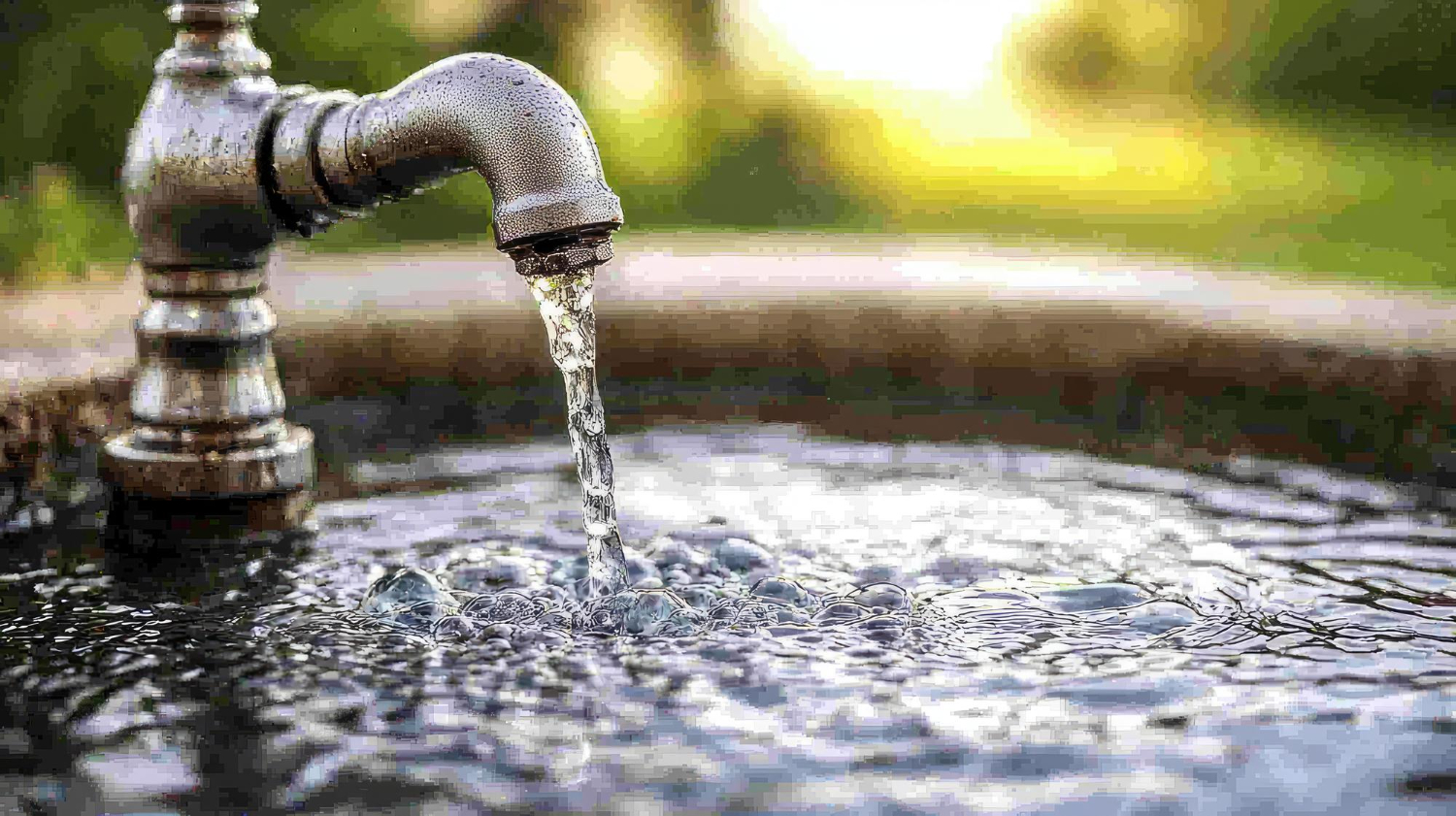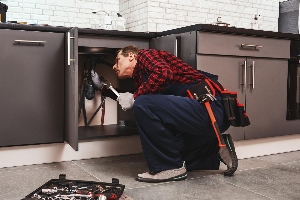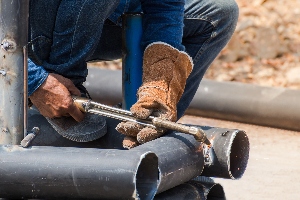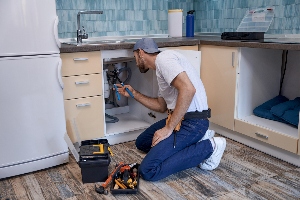When it comes to your home's plumbing system, well water vs city water water matters significantly. Many homeowners find themselves wondering whether well water or city water is the better option. Both sources have distinct characteristics that can affect your pipes, appliances, and overall plumbing health.
Well water and city water each impact your plumbing differently, with city water offering more consistent treatment and regulation while well water provides more control but requires additional maintenance and filtration systems.
With well water, you're responsible for testing and treating any contaminants or minerals that might damage your plumbing over time. City water, though treated by municipalities, may contain chlorine and other chemicals that can affect pipe longevity.
We understand that choosing between these water sources involves weighing several factors including cost, maintenance requirements, and water quality.
While city water users pay monthly bills but have fewer maintenance concerns, well water users avoid water bills but must budget for occasional system repairs and regular water testing. Your location, property size, and existing infrastructure will also influence which option makes more sense for your home's plumbing system.
In this article, you’ll learn how well water vs city water impacts your home’s plumbing system over time.
Let’s break down the key pros, cons, and maintenance factors that every homeowner should consider:
Keep reading!
What's the difference between well water and city water?
Well water and city water come from different sources and undergo different treatment processes. These differences affect everything from taste and pressure to maintenance requirements and costs for homeowners.
How city water is sourced, treated, and delivered
City water typically comes from surface water sources like lakes, rivers, and reservoirs. Municipal water authorities collect this water and send it to treatment facilities. There, the water undergoes several purification steps including:
- Coagulation and flocculation (removing large debris)
- Sedimentation (allowing particles to settle)
- Filtration (removing smaller particles)
- Disinfection (usually with chlorine or chloramine)
After treatment, the water travels through a network of main lines and smaller pipes to reach homes. City water is heavily regulated by the EPA and must meet strict quality standards. Regular testing ensures it remains safe for consumption.
The municipality handles all maintenance of the main water lines. Homeowners are only responsible for the pipes on their property.
How private well systems work in South Carolina
In South Carolina, private wells tap into underground aquifers. These natural underground reservoirs hold water that has filtered through layers of soil and rock. A typical well system includes:
- A drilled well shaft (usually 100-400 feet deep)
- A pump to bring water to the surface
- Pressure tanks to maintain consistent water pressure
- Optional filtration systems
Unlike city water, well water isn't automatically treated. In South Carolina, well owners must test their water quality themselves. The South Carolina Department of Health and Environmental Control recommends annual testing for bacteria, nitrates, and pH levels.
Groundwater plays a national role as well: the USGS reports that over 115 million Americans rely on groundwater for drinking, with more than 43 million served by private wells. This scale reinforces the importance of consistent testing and system upkeep.
Well owners are responsible for all maintenance and repairs to their systems. This includes pump replacements, pressure tank issues, and addressing contamination.
Key differences in pressure, taste, and water flow
Well water and city water offer noticeably different experiences in daily use. Well water typically has a more mineral-rich taste that many people prefer. It's free from chlorine and other treatment chemicals that can affect flavor.
Water pressure differences are significant. City water systems maintain consistent pressure, usually between 45-80 psi. Well systems rely on pressure tanks that cycle on and off, which can create fluctuations in water flow.
Water hardness also varies. Well water in South Carolina often contains more minerals like calcium and magnesium. This can lead to:
- Scale buildup in pipes and appliances
- Spotty dishes after washing
- Soap that doesn't lather well
City water generally offers more consistent flow rates, while well water flow can vary with drought conditions or pump capacity. During power outages, city water usually continues flowing, while well systems need electricity for their pumps.
Pros and Cons of using well water
Well water offers homeowners a different experience compared to city water. The source of your water impacts both your plumbing system and your wallet in several ways.
According to the EPA, roughly half of U.S. households depend on groundwater for domestic use, making leak prevention and proper well maintenance essential for long-term water reliability.
Advantages: No monthly bill, natural minerals, independence
One clear benefit of well water is the absence of monthly water bills. Once your well is installed, the water itself is free, saving you hundreds or thousands of dollars annually.
Well water naturally contains minerals like calcium, magnesium, and iron that can be beneficial for health. These minerals give well water a distinct taste that many prefer over the treated flavor of city water.
Having a private well means complete independence from municipal systems. We don't face water restrictions during droughts or worry about citywide contamination issues. If the power goes out, a generator can keep your well pump running while city residents might lose water service.
Your water supply is truly yours to control. You decide if and how to treat it, without chemicals like chlorine that cities typically add to public water.
Disadvantages: Maintenance, filtration needs, risk of contamination
Well ownership comes with maintenance responsibilities. The pump, pressure tank, and well itself need regular inspection and occasional repairs. These costs can range from a few hundred to several thousand dollars when major components fail.
Most wells require some level of filtration. Sediment filters, water softeners, or iron removal systems are common needs that add to your initial and ongoing costs.
Unlike city water, well water isn't monitored by government agencies. This means the burden of testing falls on you. We recommend testing your well water annually for bacteria, nitrates, and other contaminants.
Contamination risks include:
- Agricultural runoff
- Septic system leakage
- Industrial pollution
- Natural minerals at harmful levels
Common plumbing issues with untreated well water
Hard water from wells can cause significant plumbing problems. Mineral buildup narrows pipes, reduces water pressure, and shortens the lifespan of appliances like water heaters and dishwashers.
Iron and manganese can stain fixtures and clothing. The reddish-brown or black stains are difficult to remove and can permanently damage porcelain and fabrics.
Acidic well water corrodes metal pipes and fixtures. This leads to pinhole leaks, blue-green staining, and potentially harmful metals leaching into your water supply.
Sediment from wells can clog aerators, shower heads, and appliance inlet screens. Regular cleaning becomes necessary, and without proper filtration, these issues will persist.
Pros and cons of using city water
City water, also known as municipal water, offers distinct advantages and disadvantages for homeowners. The quality, maintenance, and cost factors vary significantly from well water systems and impact your home's plumbing in different ways.
Advantages: Reliable treatment, consistent pressure, easy maintenance
City water undergoes rigorous treatment processes that ensure it meets safety standards set by the EPA. Municipal water treatment facilities remove harmful contaminants, bacteria, and viruses before the water reaches your home.
The pressure in city water systems remains consistent, typically between 40-60 psi. This reliability means your showers, dishwashers, and washing machines operate efficiently without unexpected drops in pressure.
Maintenance responsibilities fall primarily on the municipality rather than the homeowner. If issues arise with the main water line, the city handles repairs at no direct cost to you. This hands-off approach saves homeowners both time and money on system upkeep.
We find that city water users also benefit from emergency response services if water main breaks occur.
Disadvantages: Chlorine taste, monthly cost, older pipe systems in some areas
The chlorine used to disinfect city water can create an unpleasant taste and odor. While safe to drink, many homeowners install filtration systems to improve flavor.
Monthly water bills add a recurring expense to your household budget. These costs typically increase over time as infrastructure maintenance needs grow. Some municipalities also charge sewer fees based on water usage.
Older pipe systems in established neighborhoods can introduce problems. Aging infrastructure may contain lead pipes or deteriorating connections that affect water quality.
Water restrictions during droughts can limit your usage, affecting lawn care and other water-dependent activities.
Impact on appliances and fixtures over time
City water's mineral content varies by location but is generally controlled. Lower mineral content means less scale buildup in pipes, extending the life of your plumbing system.
Water heaters typically last longer with city water due to reduced sediment accumulation. We still recommend flushing water heaters annually for optimal performance.
Fixtures like faucets and showerheads maintain their appearance longer with municipal water. The controlled pH levels prevent corrosion and staining that can occur with untreated water sources.
Appliances such as dishwashers and washing machines typically require fewer repairs when operated with city water. Manufacturers often design these appliances with municipal water standards in mind.
How your water source affects your plumbing system
Your water source directly impacts the health and longevity of your home's plumbing. The choice between well water and city water brings different challenges and maintenance requirements for pipes, fixtures, and appliances.
Mineral buildup and pipe corrosion
Well water often contains higher levels of minerals like iron, calcium, and magnesium. These minerals can accumulate inside pipes, reducing water flow and eventually causing blockages. In older homes with metal pipes, this buildup happens faster and can lead to complete pipe failure.
City water contains fewer minerals but often includes chlorine for disinfection. While chlorine keeps water safe, it can corrode copper pipes over time. This corrosion might create pinhole leaks that are difficult to detect until significant damage occurs.
Hard water (from either source) leaves scale deposits on fixtures and inside water heaters. This shortens their lifespan and reduces efficiency. We've seen water heaters fail twice as quickly in homes with untreated hard water compared to those with treated water.
Need for filtration, softeners, or pressure regulators
Well water typically requires more filtration than city water. A sediment filter removes particles, while contaminant filters like reverse osmosis systems remove bacteria and chemicals. Testing well water annually helps determine what filtration you need.
Water softeners benefit both water sources but are especially important for well users. They remove hardness minerals through ion exchange, protecting appliances and improving soap effectiveness. Most softeners need salt refills every 1-3 months.
Pressure regulators are crucial for city water connections. Municipal systems often deliver water at high pressure that can damage pipes and cause water hammer. A regulator keeps pressure between 40-60 psi, preventing stress on pipes and fixtures.
What to check before switching between systems
Before switching from city to well water, test the well water quality thoroughly. Check for bacteria, nitrates, arsenic, and pH levels. Also assess the well's capacity to meet your household's needs during peak usage times.
When moving from well to city water, inspect your existing pipes for compatibility with chlorinated water. Older galvanized pipes might deteriorate faster with city water. Budget for potential pipe replacements.
Consider the cost differences carefully. While well systems eliminate monthly water bills, they require upfront investment in pumps, tanks, and filtration. We recommend setting aside $500-1,000 annually for well maintenance. City water has predictable monthly costs but fewer maintenance concerns.
Conclusion
Choosing between well water and city water impacts your home's plumbing system in several ways. Both options have distinct advantages and challenges to consider.
Well water gives you complete control over your water supply without monthly bills. However, it requires more maintenance and may contain minerals that affect pipes over time.
City water offers convenience and consistent treatment but comes with regular costs. The chemical treatments in municipal water can sometimes be harsh on plumbing fixtures.
Your decision should reflect your location, budget, and how much maintenance you're willing to handle. Rural homeowners might find wells more practical, while urban dwellers typically benefit from city connections.
We recommend testing your water quality regardless of source. Regular testing helps identify potential issues before they damage your plumbing system.
Consider consulting with a plumbing professional to evaluate how each water source might affect your specific home. They can suggest appropriate filtration systems or treatment options to protect your pipes.
The best choice for your home depends on your unique situation and priorities. With proper maintenance and monitoring, both well and city water can support healthy plumbing systems for years to come.
For expert guidance on protecting your plumbing system, whether you’re on well water or city water, contact One Call Plumbing in Columbia or Greenville today.












